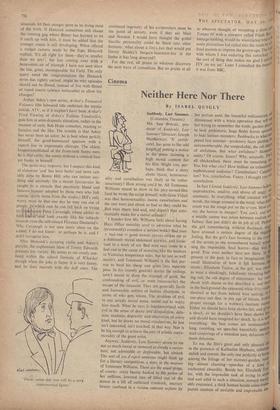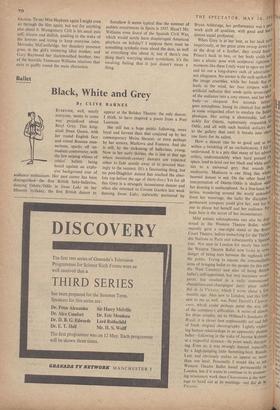Cinema
Neither Here Nor There
By ISABEL QUIGLY Suddenly, Last Summer. (Columbia. Theatre.) MR. SAM • SPIEGEL, pro- ducer of Suddenly, Last Stemmer (director: Joseph Mankiewicz; 'X' certifi- cate). has gone to 'the odd length of putting a notice in the press claiming a high moral content for his film. Might you, per- haps, think that a story abobt incest, homosexu- ality and cannibalism was likely to be rather unsavoury? How wrong you'd be. All Tennessee Williams meant to show in his play-turned-film (and he wrote the script himself, with Gore Vidal) was that homosexuality, incest, cannibalism and the rest were just about as bad as they could be. Bad man t.ne.ets bad end, and doesn't that auto- matically make for a moral attitude? .
I wonder how Mr. Williams feels about having Hays Office morality used to advertise what he (presumably) considers a serious work? Bad man + bad end = good morals always strikes me as a dubiously moral statement anyway, and irrele- vant to a work of art. Bad man mar come to a bad end in the cause of morality, like the boozers in Victorian temperance tales, but he just as well needn't, and Tennessee Williams is the last per- son to herd his sheep and goats into separate pens. In his (mostly goatish) stories the endings aren't meant to show the triumph of good, the confounding of evil, or even (necessarily) the escape of the innocent. They are generally facile and foreseeable settlers of human situations, in terms of who gets whom. The problem of evil, in any strictly moral sense, seems not to worry him much. What he says is interpenetrated with evil in the sense of decay and dilapidation, delu- sion, madness, depravity and aberration of every kind; but he draws no moral conclusions, he just isn't interested, isn't touched, in that way. Nor is he big enough to achieve the sort of artistic supra- morality of the great artist.
Anyway, Suddenly,. Last Summer seems to me not so much moral or immoral as simply a carica- ture; not admirable or deplorable, but absurd. The sort of feu d'esprit someone might think up for a literary competition, a story in the manner of Tennessee Williams. There are the usual props, of course: crazy beauty backed by the power of her millions, lowered into or lifted out of the screen in a lift all curlicued ironwork; uncrazy beauty confined in a vicious convent asylum by her jealous aunt, the beautiful millionairess, threatened with a brain operation that will stajr her trying to remember the truth; garden Plan1., to look prehistoric, huge fleshy leaves sproallh to hide human monsters; flashbacks to what 111,07 pened last summer—predatory faces plotting unrememberable, the unspeakable, the nth der of awfulness. But what awfulness? Honloscves uality? Of course. Incest? Why, naturally. V all chickenfeed, there must be something elo Yes, but what else? How titillate an exhaustirig4t, sophisticated audience? Cannibalism! Can ism? Yes, cannibalism. Funny, I thought you sr cannibalism. . . . In fact I found Suddenly, Last Summer holl°:i unproductive, unalive, and above all stagY: cinematic. In everything, what counted was the words, the image aroused in the mind; what di1 count was the image put on the screen. How C vey the horror in images? You can't, and heft _A a middle course was taken between realism and fantasy that just didn't do its job at all. PerhaP5t the girl remembering without flashback mfg have aroused a certain degree of the requi, feeling. But the girl's face looming in the cor, of the screen as she remembered herself witn4 sing the impossible, final horror—that was good. You were neither here nor there, in I present or the past, in fact or imagination. 0/ small illustration of how it fell between tl stools:. Elizabeth Taylor, as the girl, was meant to wear a shockingly, fabulously revealing ha!'"' ing suit, the nth-degree of enticement : her Oice shook with shame as she described it, and theft in the background she appeared, while lit (■ 0°1115 slavered at her from behind wire netting, ia one-piece suit that, in this age of bikinis, Woke' proper enough for a women's institute outing Either we should have been shown her, and give' a shock, or we shouldn't have been shown het' and should have imagined her shock. So it is 10111 everything: the best scenes are reminiscences' long, rambling, set speeches beautifully spoke d conjurings of a mistaken past, delusions all more delusions. To me, the film's great and only pleasure 1'4' in the presence of Katharine Hepburn, infinitel7 stylish and remote, the only one perfectly at hoole among the foliage of her monster-garden, red ing—almost chanting—speeches of a kind °` enchanted absurdity. Beside her, Elizabeth TO' lor, with the impossible task of trying to seem real and solid in such a situation, seemed inevit' ably coarsened, a thick human beside some trans' parent creature of enviable and improbable di5" tinction. To see Miss Hepburn again I might even sit through the film again; but not for anything else about it. Montgomery Clift is his usual pale self, sincere and dullish, padding in the wake of the horrors and trying to keep everyone calm. Mercedes McCambridge, her thundery presence gone, is the girl's twittering idiot mother, and Gary Raymond her slackmouthed brother, two of the horrible Tennessee Williams relations that exist to gadfly round the main characters. Somehow it seems typical that the summer of sudden occurrences in Spain is 1937. Hasn't Mr. Williams even heard of the Spanish Civil War, which would surely have discouraged American playboys on holiday? I suppose there must be something symbolic even about the date, as well as everything else about it; but if there's one thing that's worrying about symbolism, it's the sneaking feeling that it just doesn't mean a thing.







































 Previous page
Previous page